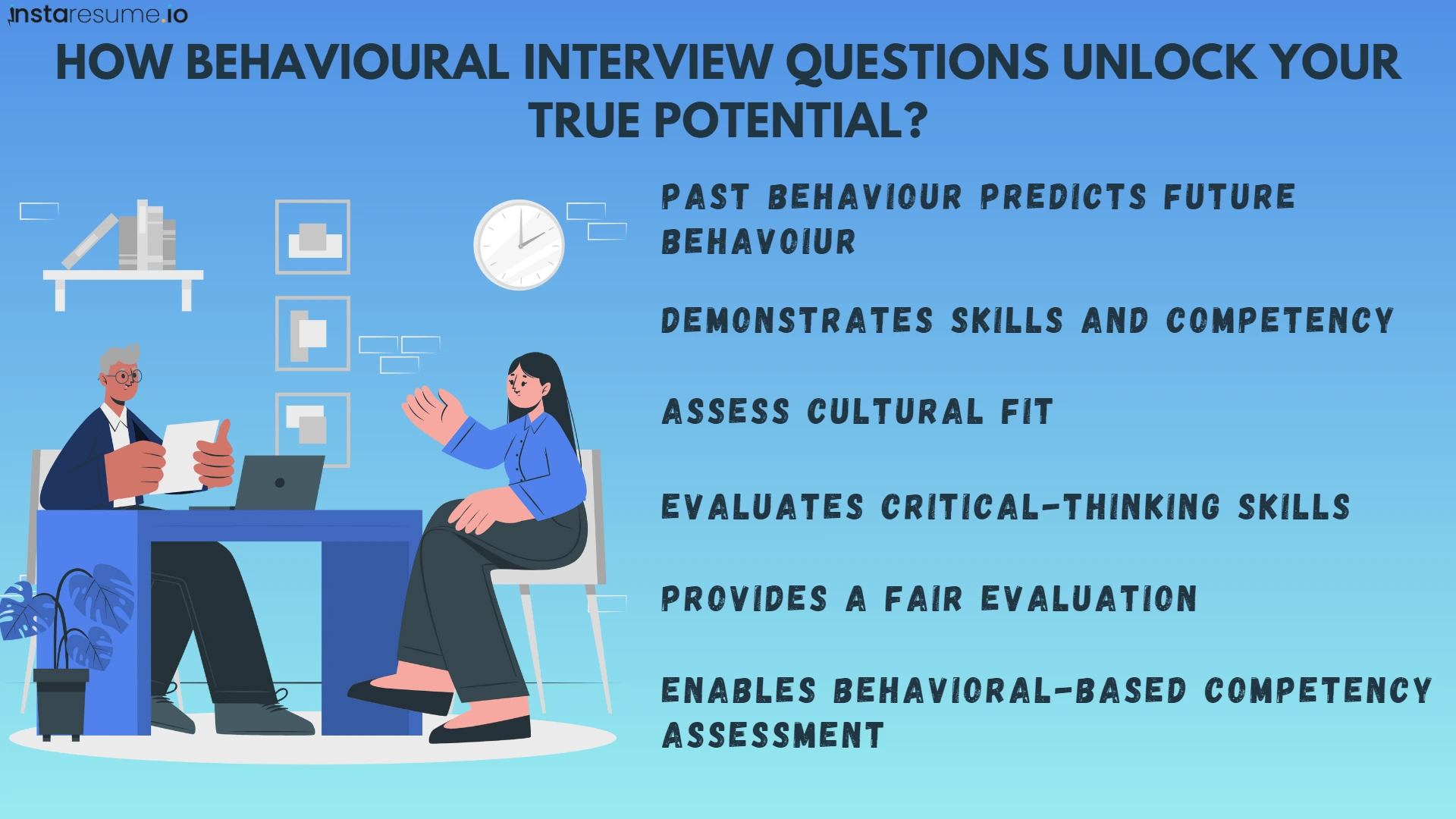Mastering Behavioral Interview Questions: Unleashing Your Potential

Unleash your potential
In today's competitive job market, employers are increasingly relying on behavioral interview questions to assess a candidate's suitability for a role. These questions delve into your past experiences and actions, allowing employers to gain insight into your problem-solving abilities, teamwork skills, and adaptability. In this blog, we will explore some of the most common behavioral interview questions and provide practical tips on how to approach them to stand out from the competition.
“Tell me about a time when you faced a significant challenge at work and how you overcame it.”
Challenges are inevitable in any professional setting, and this question gives you an opportunity to showcase your problem-solving skills. Share a specific challenge you encountered, explain the steps you took to address it and highlight the positive outcomes or lessons learned. Emphasize your resilience and ability to think creatively under pressure.
“Describe a situation where you collaborated with a diverse team to achieve a common goal.” Employers highly value teamwork and collaboration. Choose an example that demonstrates your ability to work effectively with diverse individuals, communicate clearly, and contribute to a shared objective. Highlight your role in fostering synergy within the team and overcoming any obstacles encountered along the way.
“Tell me about a time when you made a mistake and how you rectified it.”
Mistakes happen to everyone, and this question allows you to showcase your accountability and ability to learn from setbacks. Be honest about the situation, take ownership of your mistake, and explain the steps you took to resolve it. Discuss the lessons you learned and any measures you implemented to prevent similar mistakes in the future.
“Describe a situation where you successfully resolved a conflict with a colleague or customer.”
Employers want to evaluate your interpersonal skills and ability to handle difficult situations. Share an example of challenging interaction, highlighting your ability to listen actively, empathize, and communicate effectively to resolve the conflict. Emphasize the positive outcome achieved and any steps taken to maintain harmonious relationships.
“Tell me about a time when you had to meet a tight deadline.”
Time management and prioritization are crucial in today's fast-paced work environment. Choose an example that demonstrates your ability to handle multiple tasks, stay organized, and work efficiently under pressure. Discuss any strategies you employed to ensure the successful completion of the task within the given deadline.
“Describe a situation where you demonstrated initiative and leadership.”
Employers value candidates who take initiative and exhibit leadership potential. Share a specific example where you identified an opportunity, took charge of a project, or motivated others to achieve a common goal. Discuss the impact of your actions and highlight the positive outcomes resulting from your leadership.
“Describe a situation where you had to demonstrate your problem-solving skills.”
Problem-solving is a valuable skill in the workplace. Choose an example that showcases your ability to analyze a problem, generate potential solutions, and implement an effective course of action. Discuss the steps you took, the resources you utilized, and the successful resolution or improvement you achieved.
“Tell me about a time when you had to deal with a difficult team member or coworker.”
Employers want to evaluate your ability to navigate interpersonal challenges. Share an example of a difficult team member or coworker and explain how you approached the situation. Discuss how you communicated effectively, addressed any conflicts or issues, and fostered a positive working relationship. Highlight the outcome or positive impact resulting from your actions.
“Describe a situation where you had to take a calculated risk.”
This question aims to evaluate your decision-making abilities and willingness to take calculated risks. Share an example where you faced a decision involving some uncertainty or potential risk. Discuss how you assessed the situation, weighed the potential outcomes, and made an informed decision. Emphasize the positive results or lessons learned from taking that risk.
“Tell me about a time when you had to handle a difficult client or customer.”
Employers want to assess your customer service and conflict resolution skills. Share a specific example of a challenging interaction with a client or customer, highlighting how you remained calm, listened attentively, and found a satisfactory resolution. Discuss any measures you took to ensure long-term customer satisfaction.
Why Behavioural Interview questions are important?

Importance of Behavioural Interview questions
Past behavior predicts future behavior:
Behavioral questions are designed to assess how candidates have handled specific situations or challenges in the past. Research has shown that past behavior is a strong indicator of future performance. By asking candidates to describe their past experiences, employers can gain insights into how they are likely to approach similar situations in the future.
Demonstrates skills and competencies:
Behavioral questions allow candidates to showcase their skills, competencies, and abilities through real-life examples. Instead of relying solely on hypothetical scenarios or theoretical knowledge, behavioral questions require candidates to provide concrete evidence of their capabilities. This helps employers assess whether the candidate possesses the desired skills and can effectively apply them in the workplace.
Assess cultural fit:
Cultural fit is crucial for both the candidate and the organization. Behavioral questions can provide insights into a candidate's work style, values, and how they interact with others. By understanding how a candidate has behaved in different work situations, employers can determine if their approach aligns with the company's culture and values. This helps ensure a good fit between the candidate and the organization's work environment.
Evaluates problem-solving and critical-thinking skills:
Behavioral questions often focus on challenging situations or problem-solving scenarios. These questions allow employers to assess a candidate's ability to think critically, analyze complex problems, and come up with effective solutions. By listening to a candidate's thought process and the actions they took in the past, employers can gauge their problem-solving skills and determine if they align with the requirements of the role.
Provides a fair and consistent evaluation:
Behavioral questions offer a structured and standardized approach to evaluating candidates. By asking all candidates the same set of behavioral questions, employers can compare responses objectively and make fair assessments. This consistency helps mitigate bias and ensures that each candidate is evaluated based on their abilities and experiences rather than subjective factors.
Enables behavioral-based competency assessment:
Many organizations have specific competencies or behavioral traits they seek in candidates. Behavioral questions are tailored to assess these specific competencies, such as teamwork, leadership, adaptability, communication, and problem-solving. By asking candidates to provide examples of their behavior in these areas, employers can evaluate their alignment with the desired competencies.
Here's the scenario where an interviewee answered behavioral interview questions smartly:
Question: “Tell me about a time when you had to deal with a difficult coworker or team member.”
Answer:
“Certainly. In my previous role as a project manager, I encountered a situation
where I had to work closely with a team member who had a different work style and communication approach than mine. It was challenging because our conflicting styles led to miscommunication and tension within the team.
To address the situation, I decided to schedule a one-on-one meeting with the team member to discuss our differences and find common ground. During the meeting, I actively listened to their concerns and shared my own perspective in a calm and respectful manner. I focused on building rapport and understanding their work preferences and motivations.
After the conversation, I realized that the root of our conflict was a lack of clear expectations and a breakdown in communication channels. To resolve this, I proposed implementing a team communication plan that included regular check-ins, defined roles and responsibilities, and a shared project management tool to track progress. I also encouraged open and transparent communication among team members.
By actively addressing the issue and fostering an environment of open communication, we were able to resolve our differences and improve our collaboration as a team. Our productivity increased, and we successfully delivered the project on time.
This experience taught me the importance of effective communication, empathy, and understanding in resolving conflicts within a team. It also reinforced the value of creating a supportive and inclusive work environment where everyone's perspectives are heard and respected.”
In this example, the employee uses the STAR method (Situation, Task, Action, Result) to structure their response and provide a clear and concise answer. They highlight the steps they took to address the difficult coworker situation, the actions they implemented, and the positive outcome that resulted from their efforts. This approach demonstrates their problem-solving skills, communication abilities, and ability to work collaboratively with others.
Conclusion:
By understanding and preparing for common behavioural interview questions, you can confidently showcase your skills, experiences, and personal qualities. Remember to tailor your responses to highlight your unique strengths and accomplishments. Practice articulating your answers and consider using the STAR method (Situation, Task, Action, Result) to provide structured and impactful responses. With thorough preparation and a positive mindset, you can excel in behavioural interviews and position yourself as the ideal candidate for the job.
Remember, the key to answering behavioural interview questions is to provide specific examples, highlight your actions and contributions, and focus on the positive outcomes or lessons learned from each experience. Practice answering these questions using the STAR method (Situation, Task, Action, Result) to structure your responses effectively and leave a lasting impression on the interviewer.

